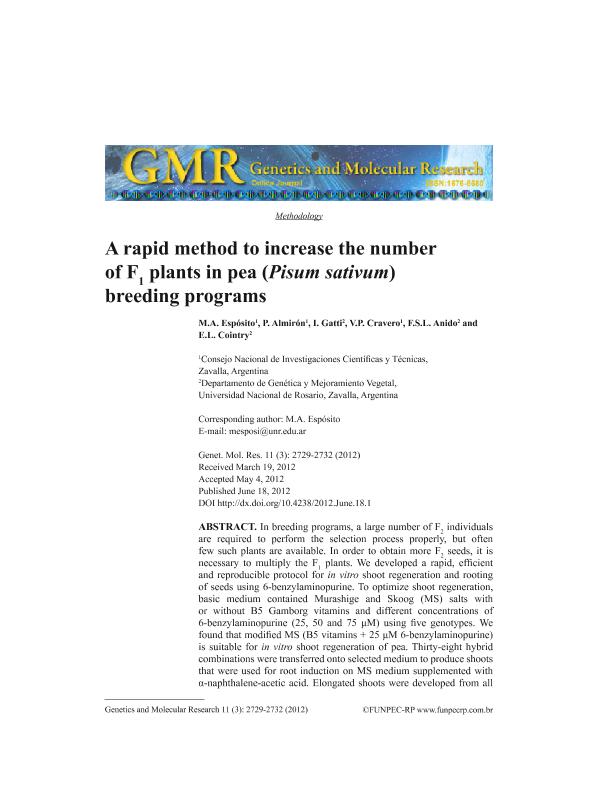Artículo
A rapid method to increase the number of F1 plants in pea (Pisum sativum) breeding programs.
Espósito, María Andrea ; Almiron, Paula
; Almiron, Paula ; Gatti, I.; Cravero, Vanina Pamela
; Gatti, I.; Cravero, Vanina Pamela ; Lopez Anido, Fernando Sebastian; Cointry Peix, Enrique Luis
; Lopez Anido, Fernando Sebastian; Cointry Peix, Enrique Luis
 ; Almiron, Paula
; Almiron, Paula ; Gatti, I.; Cravero, Vanina Pamela
; Gatti, I.; Cravero, Vanina Pamela ; Lopez Anido, Fernando Sebastian; Cointry Peix, Enrique Luis
; Lopez Anido, Fernando Sebastian; Cointry Peix, Enrique Luis
Fecha de publicación:
08/2012
Editorial:
Fundacao de Pesquisas Científicas de Riberao Preto
Revista:
Genetics and Molecular Research
ISSN:
1676-5680
Idioma:
Inglés
Tipo de recurso:
Artículo publicado
Clasificación temática:
Resumen
In breeding programs, a large number of F2 individuals are required to perform the selection process properly, but often few such plants are available. In order to obtain more F2 seeds, it is necessary to multiply the F1 plants. We developed a rapid, efficient and reproducible protocol for in vitro shoot regeneration and rooting of seeds using 6-benzylaminopurine. To optimize shoot regeneration, basic medium contained Murashige and Skoog (MS) salts with or without B5 Gamborg vitamins and different concentrations of 6-benzylaminopurine (25, 50 and 75 μM) using five genotypes. We found that modified MS (B5 vitamins + 25 μM 6-benzylaminopurine) is suitable for in vitro shoot regeneration of pea. Thirty-eight hybrid combinations were transferred onto selected medium to produce shoots that were used for root induction on MS medium supplemented with α-naphthalene-acetic acid. Elongated shoots were developed from all hybrid genotypes. This procedure can be used in pea breeding programs and will allow working with a large number of plants even when the F1 plants produce few seeds.
Palabras clave:
MICROPROPAGATION
,
IN VITRO CULTURE
,
GROWTH REGULATORS
,
SEEDS CULTURE
Archivos asociados
Licencia
Identificadores
Colecciones
Articulos(CCT - ROSARIO)
Articulos de CTRO.CIENTIFICO TECNOL.CONICET - ROSARIO
Articulos de CTRO.CIENTIFICO TECNOL.CONICET - ROSARIO
Citación
Espósito, María Andrea; Almiron, Paula; Gatti, I.; Cravero, Vanina Pamela; Lopez Anido, Fernando Sebastian; et al.; A rapid method to increase the number of F1 plants in pea (Pisum sativum) breeding programs.; Fundacao de Pesquisas Científicas de Riberao Preto; Genetics and Molecular Research; 11; 3; 8-2012; 2729-2732
Compartir
Altmétricas



